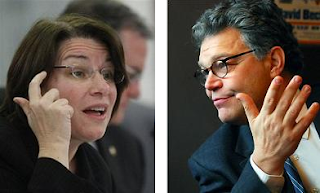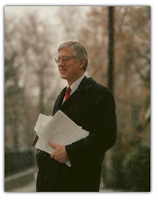 |
| Nobel Laureate Elie Weisel (wikipedia.com) |
I was reading Elie Weisel’s novel,
The Gates of the
Forest, in the summer of 1999, well before the terrorist attack on 9/11
that propelled America down the road of retaliation. That August I served as guest preacher at a
Minneapolis church where I offered words that may be even more appropriate now
than they were then. The sermon below,
How can I keep from singing, was based on the following readings:
Paul's letter to the Romans 12: 21: Do not be overcome by evil, but overcome evil with
good.
Contemporary
reading from The Gates of the Forest by Elie Wiesel:
In Elie
Wiesel’s novel, The Gates of the Forest,
Gregor, a survivor of the Holocaust, is living in Paris. A friend has persuaded him to visit the
Rabbi. After some intense discussion
about God’s role in the Holocaust, the Rabbi asks Gregor what he expects from
him.
“Rabbi,”
he said, “you asked me what I expected of you, and I said I expected
nothing. I was mistaken. Make me able to cry.”
The
Rabbi shook his head, “That’s not enough.
I shall teach you to sing. Grown
people don’t cry; beggars don’t cry.”
The
Rabbi added, “Crying is for children.
Are you still a child, and is your life a child’s dream? No, crying’s no use. You must sing.”
“And
you, Rabbi? What do you expect of me?”
“Everything.”
And
when Gregor started to protest, the Rabbi added, “Jacob wrestled with the angel
all night and overcame him. But the
angel implored him: Let me go, dawn is
approaching. Jacob let him go; to show
his gratitude, the angel brought him a ladder.
Bring me this ladder.”
“Which
one of us is Jacob?” asked Gregor. “And
which the angel?”
“I
don’t know,” said the Rabbi with a friendly wink. “Do you?
Gregor
got up and the Rabbi took him to the door.
“Promise
to come back,” he said, holding out his hand.
“I’ll
come back.”
“Will
you come to our celebrations?”
“Yes.”
How can I keep from singing
It may seem odd to bring together a passage from Paul’s
letter to the Romans about love and not returning evil for evil with a reading
from holocaust survivor and Nobel Laureate Elie Wiesel’s novel, The Gates of
the Forest. The holocaust is a symbol of evil that for most of us remains
beyond our powers of comprehension. How can we ever hope to overcome such evil
with good?
I read The Gates of
the Forest for the first time a couple of weeks ago. For years I had
avoided reading Wiesel’s works and other major holocaust literature because I
was afraid. I feared I would be overwhelmed by the enormity of the suffering
and be swallowed up by despair. I was not. Out of the depth and breadth of his
soul, Wiesel’s words overcome the evil of the holocaust. As someone else has
remarked, The Gates of the Forest is
“shot through with a strange humor of forgiveness.”
When the novel begins, Gregor, a young partisan has been
left alone, hiding in a cave during the war. His father promised to return in
three days, but three days have passed, and Gregor has stopped counting. I
won’t forget Gregor’s thoughts as from his hiding place he sees the clouds
hovering over the village below: “They were not clouds properly speaking, but
Jews driven from their homes and transformed into clouds. In this disguise they
were able to return to their homes where strangers now lived.”
To Gregor, on clear nights the stars in the heavens were
Jewish children who had died in Hitler’s ovens.
It is true what they say about Elie Wiesel, also known as the
Great Reminder: “He does not describe, he casts a spell.” I was caught in
that spell as I read the effect on first Gregor and then his companions, when
in their various hiding places, they gradually discovered it was the intent of
their persecutors to completely annihilate the Jewish people.
The enormity of it.
If there has been a paradigm shift in theological
understanding since the holocaust, it is the realization among a few at least
that our perception of reality depends on where we stand. It seems obvious now,
does it not, that those with power see reality differently from those without
power?
Reading The Gates of
the Forest altered my perception of reality in all experiences of time,
backward, forward, and in this present moment. I’ve not yet integrated the
force of the evil it reveals or the strength demonstrated by the survivors of
the holocaust to continue to live with hope and love and miraculously, forgiveness.
We know in our own country, anti-Semitism continues to flare
up here and there in hatred and vilification of innocent people. It did not end
with the holocaust. What must it do to the children? Inevitably, they must
learn about the holocaust- and then, too often, experience firsthand the
cruelty of irrational hatred. In bewilderment, just as Gregor and his
companions did, they must cry out, “What have we done that was so wrong?”
Thus, those who would persecute the innocent continue to
inflict psychic wounds even on those too young to protect themselves.
I met such a psychically wounded child nearly 20 years ago
on the campus of Mankato State University where he and I were both
students; I was a non-traditional
student in my 30s, married, and the mother of two children. He was probably
right out of high school. He was in some of my classes. He may have been drawn
to me by comments I made in our class discussions - I don’t know. I was a
Unitarian at the time, not nominally Christian, and I had a tendency to be
outspoken, especially when the topic of bigotry arose. In any case, the young
man began to follow me around as the weeks elapsed.
This was the 70s,and at Mankato, we were still feeling
repercussions from the student revolution of the 60s. There were occasional
bomb threats. Students wore outlandish costumes. But this young man stood out
even in that setting. He favored military uniforms, often decorated with Nazi
symbols. On one occasion, he confided that he was Jewish. He observed that the
Jews had been the underdogs, and he added, “I choose to identify with the Nazis
because they had power.”
On another occasion, he told me he had guns stockpiled in
his small apartment. I can’t remember my earlier responses to his remarks. I do
remember noticing the fineness and delicacy of his features. And that his eyes
were clear, and he had a gentle face.
One afternoon, my young friend sat down across from me at my
table in the student union. Once again, he began describing the arsenal he
maintained in his apartment. I don’t know what prompted my words to him that
day. It could’ve been the impatience of a mother who had heard about enough
nonsense. I looked him in the eye, and said, “When are you going to stop trying
to impress me and admit that you’re just a nice young man?”
He stood up, walked around the table and bent over to kiss
me gently on the cheek. When I ran into him a few days later, he told me he got
rid of his guns. I noticed as time passed that his style of clothing changed,
and I even recall seeing him around campus in a neat blue suit, white shirt,
and tie. One day he introduced me to the young woman who had become his
fiancée.
Once in awhile over the years, I’ve had occasion to remember
him, always with affection, as a bright young man with a sweet face, who only
needed a brief acknowledgment of his humanity to be who he really was at heart.
I remembered him after the shooting in Columbine High School
in Littleton, Colorado. My son Steve lived in Milwaukee at the time, and he and
I were on the phone discussing the horror of the Columbine incident. It was one
of those moments, when I said, “Son, did I ever tell you about...”
And I told him about the young Jewish student who had
forever touched my life at Mankato.
There are many among us, I think, who would benefit from a
brief acknowledgment of their humanity, an acknowledgment that opens the door
for love to overcome the nightmare of alienation.
Several years after the incident in Mankato, where I majored
in English, with a concentration in writing, I took a part-time job as a
receptionist at an adult residential mental health facility; the job allowed me
to contribute to the family income while trying my hand at freelance
writing. From my desk in the front
lobby, I had the opportunity to visit with many of the residents and develop
relationships of trust with them. My hours during the week were from 5-9 p.m.
One evening as I walked through the front entrance I saw a drama unfolding. A
young male resident with whom I had become friends and a male staff member were
circling each other, fists drawn. The administrator stood helplessly by.
I walked over to the main desk and told the receptionist on
duty to stay there. I picked up an empty coffee cup and walked to a spot where
the young man could see me. I lifted the cup up high and called his name. When
he glanced toward me, I said, “Let’s go get a cup of coffee.”
In that moment, the trust he and I had established held. An
expression of relief swept over his face. His arms went down. He glanced at his
opponent as if to say, “I don’t have time for you.” And he and I walked
together into the cafeteria.
On my way past her, the administrator whispered, “Thanks.”
At coffee that evening in the cafeteria, the young man
confided what his therapist told him that day. She said that deep down in his
heart, there was a rosebud, which was now tightly closed, but in time it would
unfold, and he would be healed and whole. His face was radiant as he shared
this with me.
I never learned what triggered the incident I interrupted
that evening. I suspect the therapist’s words had so filled the young man with
hope he became agitated and unable to maintain his self control. To be safe and
healed and whole is what we all long for, I believe. Whether we are Jew or
Christian, male or female, straight or gay, black or white, young or old; it
matters not.
It has been said that in our lifetimes we human beings move
from the age of innocence to the age of experience when we can sometimes get
lost in that too prevalent state of cynicism and despair where from one day to
the next a primary motivation is to get even with those who have hurt us. We
Minnesotans are yet in the developmental age of experience when, in reference
to Gov. Jesse Ventura’s former life as a professional wrestler, we display
bumper stickers that read, “My governor can beat up your governor.”
The third age to which human beings can aspire is the age of
wisdom. It is the same wisdom that teaches us to not be overcome by evil, but
to overcome evil with good. I don’t think any of us progresses neatly from one
stage to the next, rather we continue to visit each of the three from time to
time and hopefully as we mature, we most often choose the way of wisdom.
In its concluding chapters, The Gates of the Forest draws us toward the age of wisdom. Gregor
has come to see the Rabbi in search of answers. They engage in a prolonged and
intense discussion in which Gregor wants the Rabbi to acknowledge that in the
holocaust God has abandoned the Jewish people.
To a certain extent the Rabbi acknowledges this harsh
reality but in his next words to Gregor, we know that he understands it was not
God who abandoned the Jewish people, it was other human beings who abandoned
them: “Who says, that power comes from a shout, an outcry rather than from a
prayer? From anger rather than compassion? Where do you find certainties when
you claim to have denied them? A song on the lips is worth a dagger in the
hand...”
The Rabbi continues, “There is joy as well as fury in the
Hasid’s dancing. It’s his way of proclaiming, ‘You don’t want me to dance; too
bad, I’ll dance anyhow. You’ve taken away every reason for singing, but I shall
sing. I shall sing of the deceit that walks by day and the truth that walks by
night, yes, and of the silence of dusk as well. You didn’t expect my joy, but
here it is; yes, my joy will rise up; it will submerge you.’”
Thus, the Rabbi instructs Gregor in the art of standing for
himself without standing against anyone else - one of the most difficult arts any
of us ever has to learn.
That evening, the Hasidic Jews sang and danced, and Gregor
saw “the joy roll in great waves over the hall; they shouted out their
happiness, climbed invisible ladders, discarded them when they ceased to be of
use.”
“Bring me that ladder,” the Rabbi told Gregor.
“Which of us is Jacob and which is the angel?” Gregor asked.
“I don’t know,” the Rabbi replied, “Do you?”
We never know, do we? It is best perhaps that we do not.
A few years ago, I organized a talent show and acted as the
emcee for the residents of a long-term women’s shelter, long term meaning they
could live there for a maximum of two years. Each woman had a personal history
of immense pain and suffering and faced many obstacles toward getting back on
her feet again and rejoining the mainstream.
The shelter was located on the grounds of a convent. The
audience the night of the talent show included the shelter staff and the nuns
from the convent. Both orders came, the active and the contemplative. I was
told it was rare for the contemplative sisters to attend something like this.
We framed the talent show as a means of thanking God for the
many gifts of the participants and celebrating those gifts. One woman sang the Ave
Maria. Another played a whimsical flute solo. There was also a piano solo.
A woman read a moving poem she had written. One gave a demonstration of pottery
making; another demonstrated flower arranging. There was dancing and a couple
of skits which poked gentle fun at the ways of the shelter. The child’s little
red wagon, loaded down with hundreds of pages representing the shelter’s rule
book, drew laughter from our audience as one of the women pulled it across the
stage.
I’m here to tell you there were ladders passed back and
forth the evening of the talent show. And no one there could have told who the
angels were in that rather unique crowd. At the conclusion of the program, the
participants and the audience stood and together sang the hymn, How Can I
Keep From Singing.
As I helped the women fold up the chairs and put them away
that evening after the show was over and the audience had left, I heard many
comments such as, “That was fun. We should do things like that more often.”
Their lingering joy was pleasant to witness.
“No, I will not teach you to cry,” the Rabbi said to Gregor,
“I will teach you to sing.”
“And what do you expect from me,” Gregor asked the Rabbi.
“Everything,” the Rabbi replied.
I should guess that everything is expected of us, too.
Thanks be to God. Amen.
Let’s stand at this time and sing How can I keep from
singing, number 25 in the New Century Hymnal:
P.S.
Follow the link for the lyrics and to listen to How can I keep from singing:














